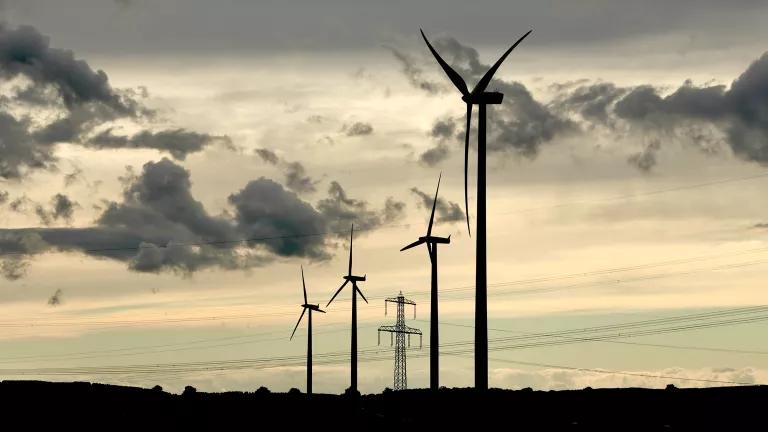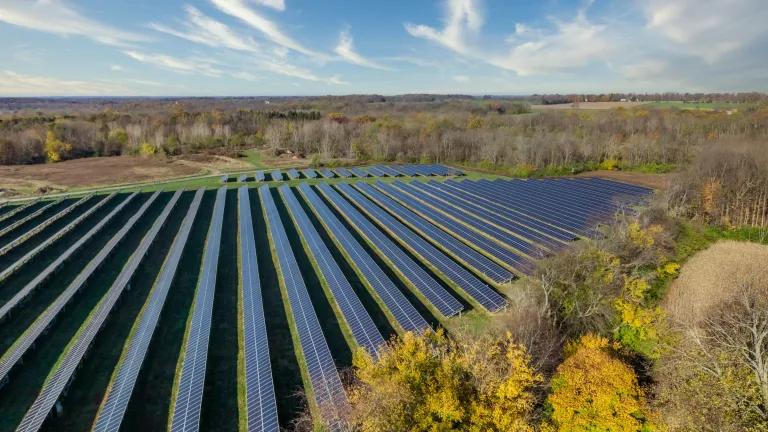Congress Should Reform Energy Tax Credits

Congress squandered an opportunity to pass a clean energy tax incentive package at the end of 2019, setting back our fight against climate change and the ability to unlock customer savings, job creation, and clean air and water.
Lawmakers must promptly recover their fumble by extending the clean energy credits left out of last month’s bill. In parallel, they should develop a long-term solution that replaces unpredictable, temporary extensions of tax credits with durable incentives for clean technologies.
In an era of extreme partisanship, policy alignment is hard to find. Fortunately, a smarter clean energy tax credit approach is fertile ground for bipartisan agreement. Both Democrats and Republicans support clean energy innovation, as demonstrated by increased funding for the Department of Energy’s research and development programs last year and this year.
Successful clean energy innovation requires a 3-part policy package:
- Research, development, and demonstration funding;
- Financial incentives to deploy clean technologies; and
- Standards—such as for energy efficiency, clean vehicles, and clean energy—that ensure carbon reductions.
Smart energy tax reform falls into the essential second category. It should ensure certainty for clean energy investors, remove fossil fuel subsidies, and accelerate deployment of pollution-reducing technologies. And thanks to Sen. Ron Wyden’s (D-OR) Clean Energy for America Act introduced last May, Rep. Tom Reed’s (R-NY) bipartisan Energy Sector Innovation Credit Act proposed last week, and numerous proposals that would eliminate fossil subsidies, momentum is building on both sides of Capitol Hill and the aisle.
Congress should combine and build upon the progress and pass a smarter energy tax credit system in line with the urgent need to address climate change.
Energy Taxes Need Reform
Congress is stuck in a cycle where tax incentives for clean energy technologies like efficiency, renewable power, and zero-emission vehicles keep expiring, requiring repeated legislative efforts to extend them. The leading Republican and Democrat on the Senate Finance Committee agree we must move past an unhelpful pattern of relying on “extenders” to a long-term solution.
Short-term credits set up an exhausting Sisyphean task that can be avoided through smart reform that automatically updates incentives. Repeated “extenders” perpetuate uncertainty and discourage long-term planning by clean energy investors and developers. This figure shows the drop in wind energy investment in 2013 after the 2012 expiration of the Wind Production Tax Credit.

The current system of mercurial, tech-specific energy tax credits must be replaced with a predictable, forward-looking policy that provides certainty for investors and is designed to achieve a specific goal: economy-wide emissions reductions.
To be clear, maintaining clean energy investment and reducing emissions in the near term requires Congress to complete a meaningful round of extenders in 2020 to fill in the gaps in the disappointing end-of-year package, which left out updates to tax credits for energy efficiency, solar panels, energy storage, and electric vehicles.
Past federal incentives for these technologies accelerated growth in clean energy while also helping create millions of U.S. clean energy jobs, like wind tower technicians, energy storage engineers, and solar panel installers. By omitting most clean energy technologies from the credit extension, Congress penalized leading companies and missed an opportunity to achieve near-term emissions reductions and economic benefits. Lawmakers should take up another tax extenders bill in 2020, one that includes updated tax credits for the abandoned clean technologies.
After securing an improved tax extenders win, Congress should immediately develop a long-term solution that would:
- Incentivize the desired outcomes: emissions reductions, clean energy generation, and energy efficiency across all economic sectors;
- Tie incentive value to performance (e.g., emissions reduced, or clean electricity generated) rather than monetary investment;
- Provide incentives to new or significantly retrofitted facilities including power plants, vehicles, buildings, energy storage systems, and products, not just those already in operation;
- Provide long-term certainty for energy developers;
- Update incentives automatically over time in a clearly defined way as emissions intensities are reduced or technologies mature and decrease in cost; and
- Provide incentives to the full range of entities that deploy clean energy, including individuals, businesses, utilities, investors, non-profits, and electric cooperatives.
The Wyden and Reed bills reflect several of these principles, but there’s still work to do to make these proposals stronger and more comprehensive. For example, neither bill includes tax credits for emissions-reducing upgrades at industrial facilities. In addition, in the current policy context, a tax credit focused on emerging technologies (such as Rep. Reed’s proposal) is insufficient without a corresponding deployment-focused incentive (like Sen. Wyden’s).
Nonetheless, these bills have already catalyzed creative discussion in Congress and urgency for reforming our outdated energy tax system.
Replace Fossil Fuel Subsidies with Clean Energy Incentives
Congress should pair a fix to clean energy tax incentives with savings from amendments to the fossil fuel tax code. Fossil fuels have received permanent tax subsidies for over 100 years and continue to receive billions more in annual subsidies than clean energy (e.g., permanent oil industry tax credits exceed electric vehicle credits by a wide margin).
The United States is the world’s second-largest fossil fuel subsidizer, spending more than $26 billion of public funding annually to prop up the mature fossil fuel industry, including billions in direct tax credits.
A climate-friendly update to the energy tax code must fix the longstanding market distortions and the catastrophic impacts from fossil fuel subsidies and redirect that money toward clean energy deployment.

Source: Oil Change International
Accelerating Toward a Clean Energy Future
Staving off the worst effects of climate change requires a wide-ranging set of policies to ramp up investment in clean energy and ensure emissions reductions. Fair and predictable federal support for clean technologies via the tax code is essential, especially while we lack other policy tools to invest public funds in clean energy deployment. It’s time to move past annual debates and constant uncertainty to a tax system that fights the climate crisis, reduces energy bills, and creates millions of new jobs.




